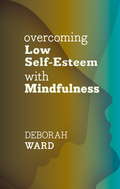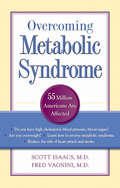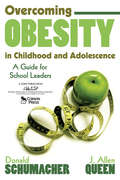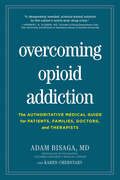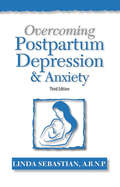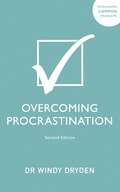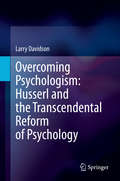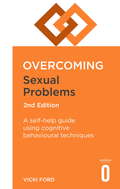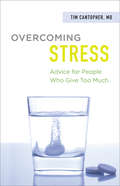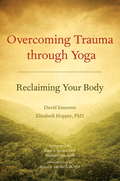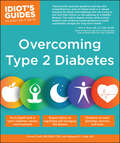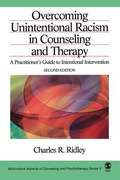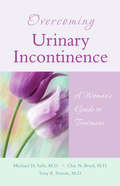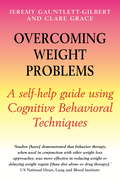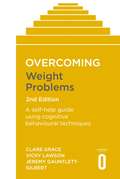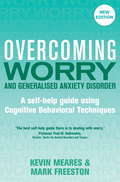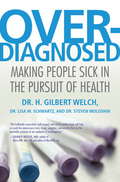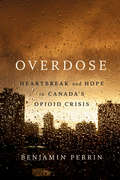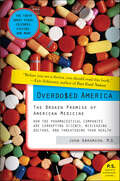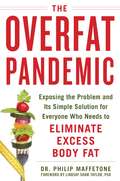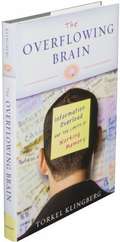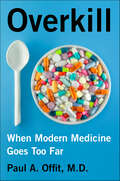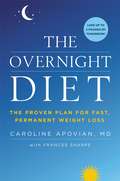- Table View
- List View
Overcoming Low Self-Esteem with Mindfulness
by Deborah WardBy working on self-esteem with the tools of mindfulness, this book offers readers the freedom to break out of unconscious thought habits which dictate unsatisfactory lives and to achieve real freedom and fulfilment.Perhaps no other self-help topic has spawned so much advice and so many conflicting theories as self-esteem. It’s like salt – a little gives flavour, strength and coherence to our personalities, while lack of it leads to an anodyne life of putting up with abusive situations or relationships, leading to depression and lack of fulfilment. On the other hand, too much self-esteem can create an unappealing sense of entitlement, pointing to the twisted paths and dark woods of narcissism. Using the concept of mindfulness, which has been defined as paying attention in a particular way, this book looks at the ongoing meditative practice required to gain the right balance of self-esteem in a flexible and effective way.
Overcoming Metabolic Syndrome
by Scott Isaacs Fred VagniniTwenty-seven Percent of Americans Have Metabolic Syndrome It's now estimated that 55 million Americans have metabolic syndrome; however, if you're like most Americans, you may not have ever heard of the syndrome much less understand how it increases your risk of heart disease and stroke. Metabolic syndrome actually is a cluster of disorders, all of which are affected by both genetics and lifestyle. If you have three or more of the following, you considered as having metabolic syndrome: · A waistline of 40 inches or more for men and 35 inches or more for women · High triglyceride levels · High blood pressure · Elevated fasting blood sugar levels · Low HDL cholesterol levels (the good cholesterol) There are no specific symptoms of metabolic syndrome, but it takes a toll on health. People with metabolic syndrome are 3.5 times more likely to die of a heart-related ailment and 5 times more likely to develop type 2 diabetes. The good news is that you can overcome this deadly syndrome. The authors of Overcoming Metabolic Syndrome, an endocrinologist and a cardiovascular surgeon, have treated thousands of patients; they know how to cut through the confusion and give you're the basics about how you can restore your health. Among the questions they answer:· How do I know if I have metabolic syndrome?· What is insulin resistance? Why is it a critical issue?· Why does insulin resistance make it so hard to lose weight?· What is the role of exercise, diet, and nutrition?· Which medications are used to treat the syndrome? A Clear and Simple Guide to Better Health!
Overcoming Obesity in Childhood and Adolescence: A Guide for School Leaders
by Donald Schumacher J. Allen QueenThis authoritative guide discusses the "do's," "don'ts," and "can'ts" that school leaders must consider when creating and implementing new school policies for wellness, nutrition, fitness, and health.
Overcoming Opioid Addiction: The Authoritative Medical Guide For Patients, Families, Doctors, And Therapists
by Adam Bisaga Karen ChernyaevFrom a leading addiction expert, a desperately needed medical guide to understanding, treating, and finally defeating opioid use disorder Drug overdoses are now the leading cause of death for Americans under the age of 50, claiming more lives than the AIDs epidemic did at its peak. Opioid abuse accounts for two-thirds of these overdoses, with over 100 Americans dying from opioid overdoses every day. Now Overcoming Opioid Addiction provides a comprehensive medical guide for opioid use disorder (OUD) sufferers, their loved ones, clinicians, and other professionals. Here is expertly presented, urgently needed information and guidance, including: Why treating OUD is unlike treating any other form of drug dependency The science that underlies addiction to opioids, and a clear analysis of why this epidemic has become so deadly The different stages and effective methods of treatment, including detoxification vs. maintenance medications, as well as behavioral therapies How to deal with relapses and how to thrive despite OUD Plus a chapter tailored to families with crucial, potentially life-saving information, such as how to select the best treatment program, manage medications, and reverse an overdose.
Overcoming Postpartum Depression and Anxiety
by Linda SebastianEvery year nearly 400,000 women—approximately 15 percent of all new mothers—face postpartum disorders. Postpartum depression is the most common complication of pregnancy, yet few understand it or are prepared to deal with it. This book examines the symptoms, causes, and treatment of postpartum depression. Topics covered include: risk factors for postpartum disorders, effects of a mother's depression on her baby, how medications and psychotherapy can help, mental health treatments and medications, and emotional support for new fathers.
Overcoming Procrastination
by Windy DrydenProcrastinating, putting things off, delaying and obstructing progress - do these sound familiar to you? They are all patterns of destructive or obstructive behaviour in a pressured world where progress is measured by results. Overcoming Procrastination, updated and modernized for 2021, demonstrates that change can only occur when we have a better understanding of our own emotions and motivations. It uses proven therapeutic techniques that centre around finding strategies for developing potential, and unlocking the door to a more effective and enriched life.
Overcoming Procrastination
by Windy DrydenProcrastinating, putting things off, delaying and obstructing progress - do these sound familiar to you? They are all patterns of destructive or obstructive behaviour in a pressured world where progress is measured by results. Overcoming Procrastination, updated and modernized for 2021, demonstrates that change can only occur when we have a better understanding of our own emotions and motivations. It uses proven therapeutic techniques that centre around finding strategies for developing potential, and unlocking the door to a more effective and enriched life.
Overcoming Psychologism: Husserl and the Transcendental Reform of Psychology
by Larry DavidsonThis book shows us how rather than abandoning psychology once he liberated phenomenology from the psychologism of the philosophy of arithmetic, Edmund Husserl remained concerned with the ways in which phenomenology held important implications for a radical reform of psychology throughout his intellectual career. The author fleshes out what such a radical reform actually entails, and proposes that it can only be accomplished by following the trail of the transcendental reduction described in Husserl’s later works. In order to appreciate the need for the transcendental even for psychology, the book tracks Husserl’s thinking on the nature of this relationship between phenomenology as a philosophy and psychology as a positive science as it evolved over time.The text covers Husserl’s definition of phenomenology as “descriptive psychology” in the Logical Investigations, rejecting the hybrid form of “phenomenological psychology” described in the lectures by that name, and ends with his proposal for a “fundamental refashioning” of psychology by situating it within the transcendental framework of The Crisis of European Sciences and Transcendental Phenomenology. The Author argues for a re-grounding of psychology by virtue of a “return to positivity” after having performed the reduction to transcendental intersubjectivity. What results is a phenomenological approach to a transcendentally-grounded psychology which, while having returned to the life-world, no longer remains transcendentally naïve. A phenomenologically-grounded psychology thus empowers researchers, clinicians, and clients alike to engage in social actions that move the world closer to achieving social justice for all. This text appeals to students and researchers working in phenomenology and psychology.
Overcoming Sexual Problems 2nd Edition: A self-help guide using cognitive behavioural techniques (Overcoming Bks.)
by Vicki Ford'A positive step-by-step guide to... help readers resolve their sexual difficulties. It empowers couples to set goals to meet their needs.' Nursing StandardAre you worried about impotence or loss of sexual desire, premature ejaculation or lack of orgasm? Experienced psychosexual therapist and couples counsellor Vicki Ford provides an invaluable guide to understanding the sexual problems that many people face from time to time. Her simple and effective self-help techniques, based on cognitive behavioural therapy (CBT), include practical exercise programs to help develop responsiveness and an understanding of your body. Suitable for both singles and couples, this expert guide will enable you to overcome negative thinking and restore your confidence and your sex life. Specifically, you will learn about:The importance of relaxation and stress reduction techniquesThe impact of ageing, disability, religion, infidelity, abuse, infertility, childbirth, bereavement and medication on sexual performanceTechniques for particular problemsOvercoming self-help guides use clinically proven techniques to treat long-standing and disabling conditions, both psychological and physical. Many guides in the Overcoming series are recommended under the Reading Well Books on Prescription scheme.Series Editor: Professor Peter Cooper
Overcoming Sexual Problems 2nd Edition: A self-help guide using cognitive behavioural techniques (Overcoming Bks.)
by Vicki Ford'A positive step-by-step guide to... help readers resolve their sexual difficulties. It empowers couples to set goals to meet their needs.' Nursing StandardAre you worried about impotence or loss of sexual desire, premature ejaculation or lack of orgasm? Experienced psychosexual therapist and couples counsellor Vicki Ford provides an invaluable guide to understanding the sexual problems that many people face from time to time. Her simple and effective self-help techniques, based on cognitive behavioural therapy (CBT), include practical exercise programs to help develop responsiveness and an understanding of your body. Suitable for both singles and couples, this expert guide will enable you to overcome negative thinking and restore your confidence and your sex life. Specifically, you will learn about:The importance of relaxation and stress reduction techniquesThe impact of ageing, disability, religion, infidelity, abuse, infertility, childbirth, bereavement and medication on sexual performanceTechniques for particular problemsOvercoming self-help guides use clinically proven techniques to treat long-standing and disabling conditions, both psychological and physical. Many guides in the Overcoming series are recommended under the Reading Well Books on Prescription scheme.Series Editor: Professor Peter Cooper
Overcoming Stress
by Tim CantopherSurveys of stress-related illness suggest that more than 250,000 people in the UK are experiencing stress at a level that is making them ill. Stress can indeed lead to extensive psychological and physical suffering but one thing is clear: we do have choices. "Stress will always be with us, and we will continue to suffer - unless we choose to change," says Dr Cantopher. "The good news is that this is possible - stress-related illness is avoidable, and if you change, you will attain happiness. " Topics covered include: - Causes of stress - Manifestations of stress - physical illness - Psychological conditions, such as anxiety, panic disorder, OCD, phobic states and depression - Acute treatments - Longer term management - How to avoid stress and its ill effects - Lifestyle issues - We have a choice This book offers not just facts, but a message of hope.
Overcoming Trauma through Yoga
by Elizabeth Hopper David Emerson Bessel van der Kolk Stephen Cope Peter A. LevineSurvivors of trauma--whether abuse, accidents, or war--can end up profoundly wounded, betrayed by their bodies that failed to get them to safety and that are a source of pain. In order to fully heal from trauma, a connection must be made with oneself, including one's body. The trauma-sensitive yoga described in this book moves beyond traditional talk therapies that focus on the mind, by bringing the body actively into the healing process. This allows trauma survivors to cultivate a more positive relationship to their body through gentle breath, mindfulness, and movement practices. Overcoming Trauma through Yoga is a book for survivors, clinicians, and yoga instructors who are interested in mind/body healing. It introduces trauma-sensitive yoga, a modified approach to yoga developed in collaboration between yoga teachers and clinicians at the Trauma Center at Justice Resource Institute, led by yoga teacher David Emerson, along with medical doctor Bessel van der Kolk. The book begins with an in-depth description of trauma and post-traumatic stress disorder (PTSD), including a description of how trauma is held in the body and the need for body-based treatment. It offers a brief history of yoga, describes various styles of yoga commonly found in Western practice, and identifies four key themes of trauma-sensitive yoga. Chair-based exercises are described that can be incorporated into individual or group therapy, targeting specific treatment goals, and modifications are offered for mat-based yoga classes. Each exercise includes trauma-sensitive language to introduce the practice, as well as photographs to illustrate the poses. The practices have been offered to a wide range of individuals and groups, including men and women, teens, returning veterans, and others. Rounded out by valuable quotes and case stories, the book presents mindfulness, breathing, and yoga exercises that can be used by home practitioners, yoga teachers, and therapists as a way to cultivate awareness, tolerance, and an increased acceptance of the self. From the Trade Paperback edition.
Overcoming Type 2 Diabetes (Idiot's Guides)
by Carrie S. SwiftApproximately 29 million Americans have Type 2 Diabetes, and the numbers keep rising. Idiot's Guides: Overcoming Type 2 Diabetes provides comprehensive information on everything someone with this condition needs to know. A detailed, yet positive, discussion about diabetes, content includes symptoms, monitoring, medications, and support. Helpful advice on exercise and meal planning is also included.
Overcoming Unintentional Racism in Counseling and Therapy: A Practitioner's Guide to Intentional Intervention
by Charles R. RidleyDiscusses how individuals can learn how to confront their racist attitudes and become allies.
Overcoming Urinary Incontinence: A Woman's Guide to Treatment
by Clay N. Boyd Tony E. Pinson Michael H. SafirAddressing the most commonly asked questions about incontinence, this accessible reference discusses causes, types of incontinence, and how the condition is diagnosed. The wide range of treatment options is introduced, from pelvic floor therapy and bladder training to electrical stimulation, medications, and surgeries. Eleven million women in the U.S. are coping with urinary incontinence—half of whom are too embarrassed to discuss the matter with their doctors—and this guidebook provides encouragement, showing that in more than 80 percent of cases, treatment can improve or even cure the problem.
Overcoming Weight Problems
by Clare Grace Jeremy Gauntlett-GilbertFrom their ground-breaking work with CBT techniques in London's only NHS clinic for obesity, Drs Jeremy Gauntlett-Gilbert and Clare Grace have developed this accessible self-help guide, based on clinically tested methods that will help change thinking and overcome weight problems once and for all. How to:- - Develop real motivation to change - Deal with negative patterns of thinking and blocks and understand why you have gained weight and can't shift it - Develop a healthy and sustainable eating plan and understand why quick-fix diets are not the answer- Bring more activity into life over the long term - Handle difficult emotions and physical feelings
Overcoming Weight Problems 2nd Edition: A self-help guide using cognitive behavioural techniques
by Clare Grace Vicky Lawson Jeremy Gauntlett-GilbertThis clinically tested, comprehensive course based on cognitive behavioural therapy (CBT) techniques can provide a longer-term solution to your weight problems. You'll come to understand your own psychological blocks to managing weight and discover how to sustain a healthy lifestyle. Learn how you can: - Develop the motivation to change your eating and activity- Respond to emotional eating in a helpful way- Work with the thoughts and emotions getting in the way of change- Work out a simple, healthy and sustainable eating plan that fits with your daily routine- Find easy ways to add more physical activity into your everyday lifeOvercoming self-help guides use clinically proven techniques to treat long-standing and disabling conditions, both psychological and physical. Many guides in the Overcoming series are recommended under the Reading Well scheme.Series editor: Emeritus Professor Peter Cooper
Overcoming Worry and Generalised Anxiety Disorder, 2nd Edition: A self-help guide using cognitive behavioural techniques
by Mark FreestonUp to 44 in every 1000 adults suffer from a condition known as Generalised Anxiety Disorder. This is much more than the normal worrying we all do - it can be a debilitating disorder leading to significant personal and social problems and sometimes financial loss. Using established and proven CBT techniques, expert clinicians Kevin Meares and Mark Freeston help readers to understand that it is their propensity to worry, not the multitude of problems they worry about, that is the root of the problem. The user-friendly, step-by-step approach explains why they worry, how to recognise what feeds it and develop effective methods of dealing with it. With each step the authors introduce new ideas that add to the picture of worry, and use questionnaires, exercises and tasks to help the reader understand and then challenge unhelpful habits and beliefs.
Overdiagnosed: Making People Sick in the Pursuit of Health
by H. Gilbert WelchFrom a nationally recognized expert, an exposé of the worst excesses of our zeal for medical testingGoing against the conventional wisdom reinforced by the medical establishment and Big Pharma that more screening is the best preventative medicine, Dr. Gilbert Welch builds a compelling counterargument that what we need are fewer, not more, diagnoses. Documenting the excesses of American medical practice that labels far too many of us as sick, Welch examines the social, ethical, and economic ramifications of a health-care system that unnecessarily diagnoses and treats patients, most of whom will not benefit from treatment, might be harmed by it, and would arguably be better off without screening.Drawing on twenty-five years of medical practice and research on the effects of medical testing, Welch explains in a straightforward, jargon-free style how the cutoffs for treating a person with "abnormal" test results have been drastically lowered just when technological advances have allowed us to see more and more "abnormalities," many of which will pose fewer health complications than the procedures that ostensibly cure them. Citing studies that show that 10 percent of two thousand healthy people were found to have had silent strokes, and that well over half of men over age sixty have traces of prostate cancer but no impairment, Welch reveals overdiagnosis to be rampant for numerous conditions and diseases, including diabetes, high cholesterol, osteoporosis, gallstones, abdominal aortic aneuryisms, blood clots, as well as skin, prostate, breast, and lung cancers.With genetic and prenatal screening now common, patients are being diagnosed not with disease but with "pre-disease" or for being at "high risk" of developing disease. Revealing the economic and medical forces that contribute to overdiagnosis, Welch makes a reasoned call for change that would save us from countless unneeded surgeries, excessive worry, and exorbitant costs, all while maintaining a balanced view of both the potential benefits and harms of diagnosis. Drawing on data, clinical studies, and anecdotes from his own practice, Welch builds a solid, accessible case against the belief that more screening always improves health care.
Overdose: Heartbreak and Hope in Canada's Opioid Crisis
by Benjamin Perrin&“Overdose is a necessary and searching investigation into a devastating epidemic that should never have happened. Benjamin Perrin painstakingly shows that it need not continue if we, as a society, heed the evidence.&”—Gabor Maté M.D., author of In The Realm of Hungry Ghosts: Close Encounters With AddictionAn astonishing and powerful look at the ongoing opioid crisis North America is in the middle of a health emergency. Life expectancies are declining. Someone is dying every two hours in Canada from illicit drug overdose. Fentanyl has become a looming presence—an opioid more powerful, pervasive, and deadly than any previous street drug. The victims are many—and often not whom we might expect. They include the poor and forgotten but also our neighbours: professionals, students, and parents. Despite the thousands of deaths, these victims have remained largely invisible. But not anymore. Benjamin Perrin, a law and policy expert, shines a light in this darkest of corners—and his findings challenge many assumptions about the crisis. Why do people use drugs despite the risk of overdosing? Can we crack down on the fentanyl supply? Do supervised consumption sites and providing &“safe drugs&” enable the problem? Which treatments work? Would decriminalizing all drugs help or do further harm? In this urgent and humane look at a devastating epidemic, Perrin draws on behind-the-scenes interviews with those on the frontlines, including undercover police officers, intelligence analysts, border agents, prosecutors, healthcare professionals, Indigenous organizations, activists, and people who use drugs. Not only does he unveil the many complexities of this situation, but he also offers a new way forward—one that may save thousands of lives.
Overdosed America: The Broken Promise of American Medicine
by John Abramson“Overdosed America reveals the greed and corruption that drive health care costs skyward and now threaten the public health. Before you see a doctor, you should read this book.” —Eric Schlosser, author of Fast Food NationUsing the examples of Vioxx, Celebrex, cholesterol-lowering statin drugs, and anti-depressants, Overdosed America shows that at the heart of the current crisis in American medicine lies the commercialization of medical knowledge itselfFor twenty years, John Abramson, M.D., cared for patients of all ages in a small town north of Boston. But increasingly his role as family doctor was undermined as pressure mounted to use the latest drugs and high-tech solutions for nearly every problem. Drawing on his background in statistics and health policy research, he began to investigate the radical changes that were quietly taking place in American medicine.At the heart of the crisis, he found, lies the changed purpose of medical knowledge—from seeking to optimize health to searching for the greatest profits. The lack of transparency that has become normal in commercially sponsored medical research now taints the scientific evidence published in even our most prestigious medical journals. And unlike the recent scandals in other industries that robbed Americans of money and jobs, this one is undermining our health.Commercial distortion pervades the information that doctors rely upon to guide the prevention and treatment of common health problems, from heart disease to stroke, osteoporosis, diabetes, and osteoarthritis. The good news, as Dr. Abramson explains, is that the real scientific evidence shows that many of the things that you can do to protect and preserve your own health are far more effective than what the drug companies' top-selling products can do for you—which is why the drug companies work so hard to keep this information under wraps.In what is sure to be one of the most important and eye-opening books you or your doctor will ever read, John Abramson offers conclusive evidence that American medicine has broken its promise to best improve our health and is squandering more than $500 billion each year in the process.
The Overfat Pandemic: Exposing the Problem and Its Simple Solution for Everyone Who Needs to Eliminate Excess Body Fat
by Lindsay Shaw TaylorResearch demonstrates that up to 76 percent of the world’s population—or 5.5 billion people—are overfat, defined as having sufficient excess body fat to impair health. This includes nearly 90 percent of Americans—one of the highest percentages worldwide. In The Overfat Pandemic, Dr. Philip Maffetone reveals common misconceptions regarding the real meaning of “overfat,” factors that helped cause this global pandemic, and ways individuals can remedy the situation with the proper food and exercise. Other major points in the book include: • The distinction between “overweight” and “overfat” • How normal-weight people can be overfat • Why those who exercise can still be overfat, including athletes • Why waist measurement is better than the bathroom scale • How individuals can take charge of their body fat • How the overfat pandemic can be remedied through simple lifestyle changes and without diets As little as 14 percent of the world’s population has a normal body-fat percentage, and that number may be shrinking. This book aims to curtail the overfat epidemic by exposing a decades-long problem and offering a research-based, practical solution to help prevent and treat it.
The Overflowing Brain
by Torkel Klingberg Elkhonon GoldbergAs the pace of technological change accelerates, we are increasingly experiencing a state of information overload. Statistics show that we are interrupted every three minutes during the course of the work day. Multitasking between email, cell-phone, text messages, and four or five websites while listening to an iPod forces the brain to process more and more informaton at greater and greater speeds. And yet the human brain has hardly changed in the last 40,000 years. Are all these high-tech advances overtaxing our Stone Age brains or is the constant flood of information good for us, giving our brains the daily exercise they seem to crave? In The Overflowing Brain, cognitive scientist Torkel Klingberg takes us on a journey into the limits and possibilities of the brain. He suggests that we should acknowledge and embrace our desire for information and mental challenges, but try to find a balance between demand and capacity. Klingberg explores the cognitive demands, or "complexity," of everyday life and how the brain tries to meet them. He identifies different types of attention, such as stimulus-driven and controlled attention, but focuses chiefly on "working memory," our capacity to keep information in mind for short periods of time. Dr Klingberg asserts that working memory capacity, long thought to be static and hardwired in the brain, can be improved by training, and that the increasing demands on working memory may actually have a constructive effect: as demands on the human brain increase, so does its capacity. The book ends with a discussion of the future of brain development and how we can best handle information overload in our everyday lives. Klingberg suggests how we might find a balance between demand and capacity and move from feeling overwhelmed to deeply engaged.
Overkill: When Modern Medicine Goes Too Far
by Paul A. OffitA look at fifteen popular medical treatments that have been shown to be far more harmful than helpful, yet are still recommended by doctors.Modern medicine has made major advances in the last few decades, as more informed practices, thorough research, and incredible breakthroughs have made it possible to successfully treat and even eradicate many serious ailments. But we still rely on medical interventions that are vastly out of date and can adversely affect our health. In Overkill, Dr. Paul a Offit debunks fifteen common medical interventions that continue despite mounting evidence they are damaging or even deadly. Discussing everything from vitamins, sunscreen, and eyedrops for pinkeye to more serious procedures like heart stent placement and knee surgery, Offit—an acclaimed medical expert and patient advocate—tears down prolific medical propaganda that, for decades, has been causing more harm than good.Analyzing the history of how these practices came to be, the biology of what makes them so ineffective, and the medical culture that has consistently turned a blind eye, Overkill seeks to move the needle far away from these counterproductive treatments—and help patients advocate for their health. By educating ourselves, we can ask better questions and bring a much-needed skepticism to some of the drugs and surgeries that are too readily available—and too heavily promoted.
The Overnight Diet: The Proven Plan for Fast, Permanent Weight Loss
by Caroline Apovian Frances SharpeTHE OVERNIGHT DIET is the world's first medically proven diet to produce instant, lasting results. You will lose up to 2 pounds the first night, 9 pounds the first week, and continue your weight loss. Now Caroline Apovian MD., leading expert and authority on nutrition and weight management, brings you the diet that has helped thousands of her patients lose weight- and keep it off. Dr. Apovian's specially formulated 1-Day Power Up jump-starts your fat burning and weight-loss overnight, then the 6-Day Fuel Up keeps your body in fat-burning mode while offering you a bounty of tasty food options, including hamburgers, peanut butter, even chocolate! No food is off limits. Plus all-you-can-eat fruits and vegetables. The Overnight Diet achieves lightning-fast weight loss, burns fat not muscle, reduces water retention and bloating, staves off hunger pangs, and prevents plateaus. This is the ultimate blueprint to slim down, and lose the weight you want, whether its 5 pounds or 50 pounds! THE OVERNIGHT DIET developed by a renowned medical doctor has been proven safe and effective. It is the only weight-loss program that: Is formulated for rapid weight loss that you'll keep off once and for all Revs up your metabolism to burn more fat faster Let's you eat your favorite foods-and still lose pounds and inches Turns off the genes that caused your weight gain Lets you exercise less while burning more fat Boosts your levels of HGH, the body's natural flab fighter Reduces your risk of diseases like heart disease, type 2 diabetes, and cancer
